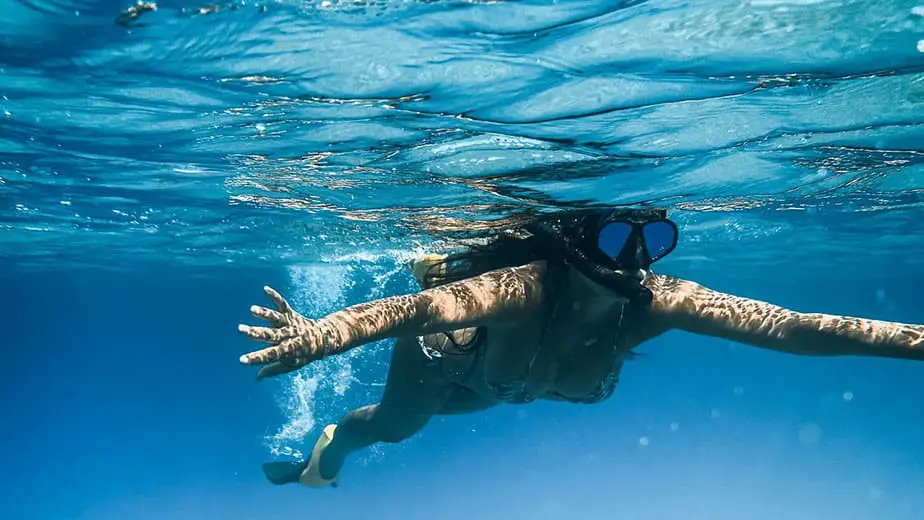Snorkeling is not only a fun hobby to have, it’s also a great way to exercise and improve your health. Everybody knows how great exercise is for their health, the problem isn’t a lack of knowledge – it’s a lack of drive to exercise. Snorkeling handily solves this problem by being a fun activity that also happens to be active. Thus, snorkeling can provide numerous health benefits with less chances of burning out.
When you snorkel, you get access to a multitude of health benefits. Just to name a few, you can burn calories (great for weight loss), improve your cardiovascular health, decrease stress, get some vitamin D from being outside, tone your muscles, and much more. In this article, we’ll dig into how snorkeling can provide each of these health benefits and why you should have them in your life.
Improve cardiovascular health
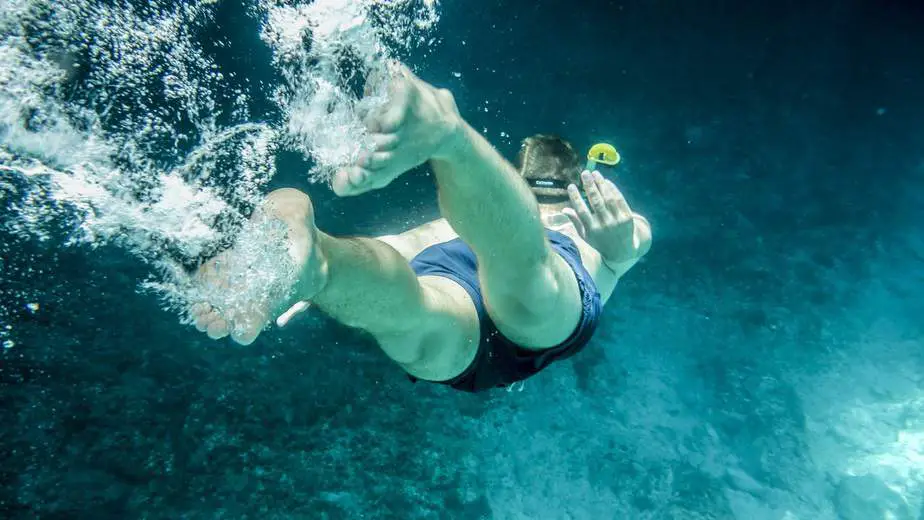
Since snorkeling is so similar to swimming, it is also considered to be a cardiovascular exercise. This means that the cardiovascular system of the body (the heart and circulatory system) is being worked and becoming more efficient. When a snorkeler is kicking or paddling while out in the water, their heart rate will be elevated for the duration of the snorkeling session.
As the cardiovascular system becomes acclimated to the higher work capacity, it will become better able to keep up with a snorkeler’s physical demands. Where a beginner snorkeler may be out of breath after a few minutes, an experienced snorkeler would not be winded at all. This health benefit naturally translates well to other aspects of physical fitness in the real world, such as being able to sprint for longer or climb a flight of stairs with no problem.
Additionally, someone with a strong cardiovascular system will be less likely to suffer from a heart-related disease like stroke or heart attack. They are also able to perform a greater number of physical activities like running, jumping, climbing, and even bedroom activities with more stamina. Essentially, every physical activity is improved because you are not limited by lack of oxygen transport.
Of course, snorkeling is not the only exercise that can do this, but it certainly is one of the most fun. Additionally, all of this exercise burns roughly the same amount of calories as a brisk walk. Thus, when you’re on vacation and you don’t want to feel guilty about all of the food you’re eating, you can just go out for a snorkel and it’s just like you kept up your regular cardio regimen of walking or hiking while on vacation.
Don’t let a vacation be an excuse to be unhealthy; snorkel enough and you may even improve your cardiovascular conditioning when you return.
Improve aerobic fitness
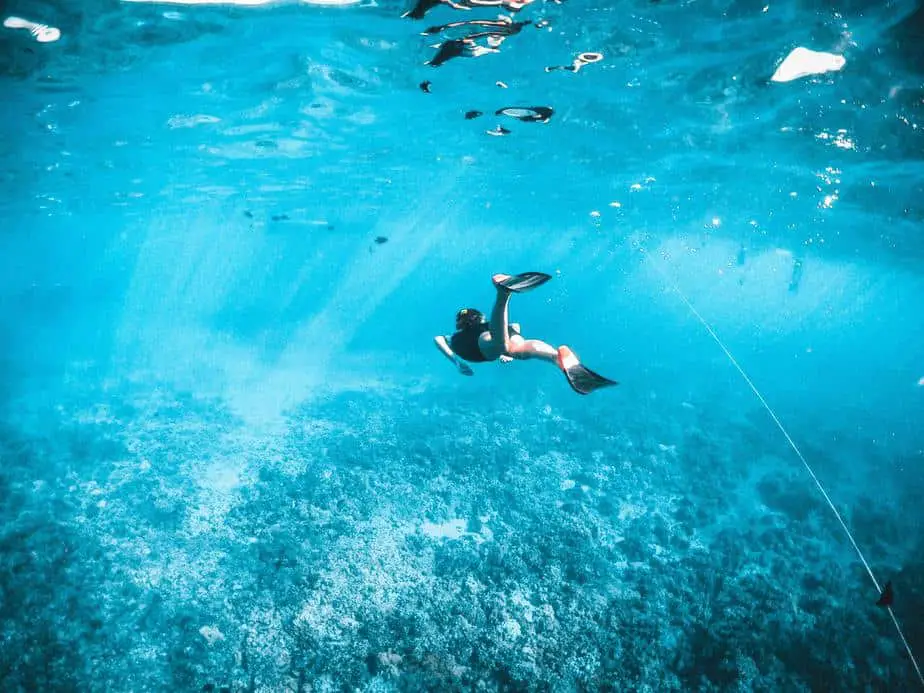
In addition to improving one’s cardiovascular system, snorkeling can also improve one’s aerobic fitness. This is closely related to what was discussed above because it involves oxygen transport in the body. When the respiratory system is conditioned, it means the lungs are able to take in oxygen more efficiently.
Over time, an adept snorkeler becomes more efficient, meaning that their body can output more energy while using up less oxygen than an untrained snorkeler. This is especially prominent in skin divers, who practice breath-hold dives in addition to regular snorkeling.
The more one trains with breath-hold dives, the more they increase their lung capacity. Skin divers also learn to be more efficient with their movements, because each wasted movement is akin to wasting oxygen. These astute divers will begin to cut out more and more wasted movements until they are spending the least amount of energy for the most output.
Rapid weight loss

As we mentioned, snorkeling burns calories equivalent to power walking for the same amount of time. It doesn’t quite burn the same amount of calories as scuba diving, however much of a snorkeler’s body is submerged and one must fight against the water resistance which burns roughly 250-300 calories an hour.
Since the majority of the time spent snorkeling is merely floating along the surface of the water with the occasional adjustment, the amount of calories burned is among the low end compared to other cardiovascular exercises. However, the benefit is that snorkeling is much more fun and doesn’t feel like exercise, yet it is comparable in burning calories equivalent to a brisk walk. Seems pretty good to us.
Do we really need to get into why weight loss is good for your overall health? Let’s do a quick summary.
If you’re overweight, losing weight provides the following benefits (among many):
- Less stress on your joints.
- Decreased risk of diabetes and cancer.
- Decreased cholesterol which reduces risk of heart disease and stroke.
- Decreased blood pressure.
- Better sleep quality by reducing likelihood or severity of sleep apnea.
- Improved insulin resistance.
- Social benefits – you look and feel better which improves your mood and outlook.
We can go on and on, but we don’t want to beat a dead horse. Everybody knows they should lose weight, but the problem is that it’s difficult to get motivated. Perhaps a fun activity like snorkeling can help with that.
Snorkeling makes exercising fun
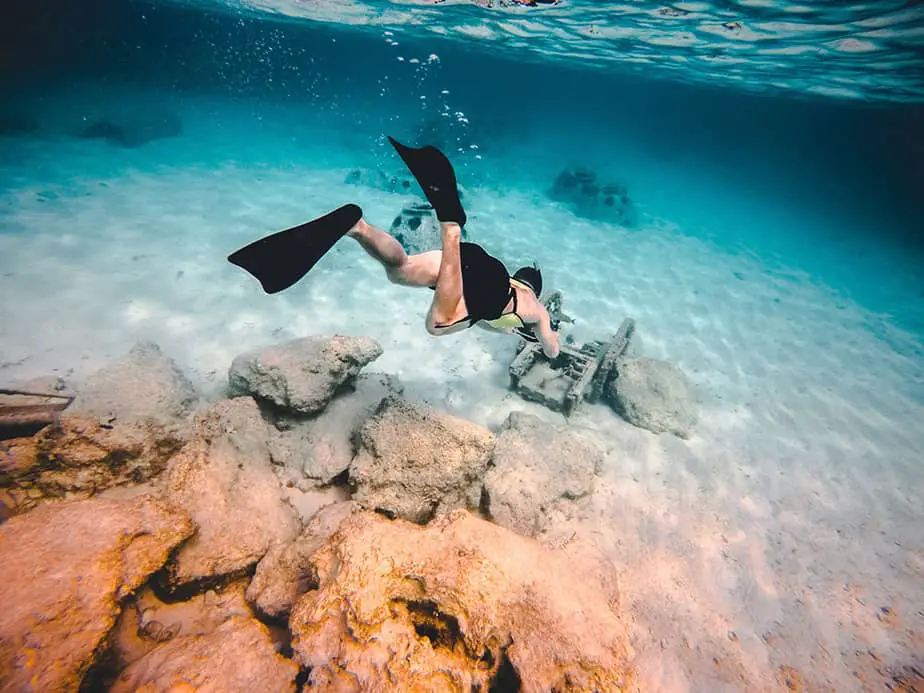
At this point we’ve already said about half a dozen times that snorkeling is fun. How exactly is it fun? And how can it be used as a motivator for unenthused people to give it a shot and fall in love with it as a form of recreation and exercise? Here’s how:
While you can snorkel alone, snorkeling at its core is a very social activity. It has a very low barrier of entry, so almost anyone can learn how to snorkel. That means you can go snorkeling with family and friends. Age is not really a limiting factor, unless you have kids that are really young for snorkeling. Otherwise, it’s a great bonding activity that you can do on vacation or for recreation to create lasting memories.
Next, the water conditions are different every time. This can be viewed as a good or bad thing. Basically, it’s unlikely you will have a monotonous snorkeling session because you can’t predict the waves and weather conditions. Thus, you must be present and focused each time, giving a more intense and arguably exciting experience each time.
Additionally, when you go snorkeling, you get to peer into the aquatic world. It looks vastly different than what we landlubbers are used to seeing and it is gorgeous. Everything from the vibrant coral reefs to the bustling school of fish feels like the flora and fauna of another world. Imagine being treated to a sight that’s more imaginative than what even the best artists can create and it stretches for miles. The visual delight just never ends.
Furthermore, snorkeling is an exercise that is light on the joints. Many cardiovascular exercises, such as running and hiking, put a lot of stress on the joints. The wear and tear can accumulate over the years and lead to joint pain. Since water exercises are done in a low gravity, low impact environment, the wear and tear on your joints is significantly reduced.
Snorkeling has numerous benefits as a form of exercise, and it has a built-in positive feedback loop. Since snorkeling gives you so many health benefits and it’s fun, you will want to keep snorkeling and keep reaping these benefits.
Improve joint health
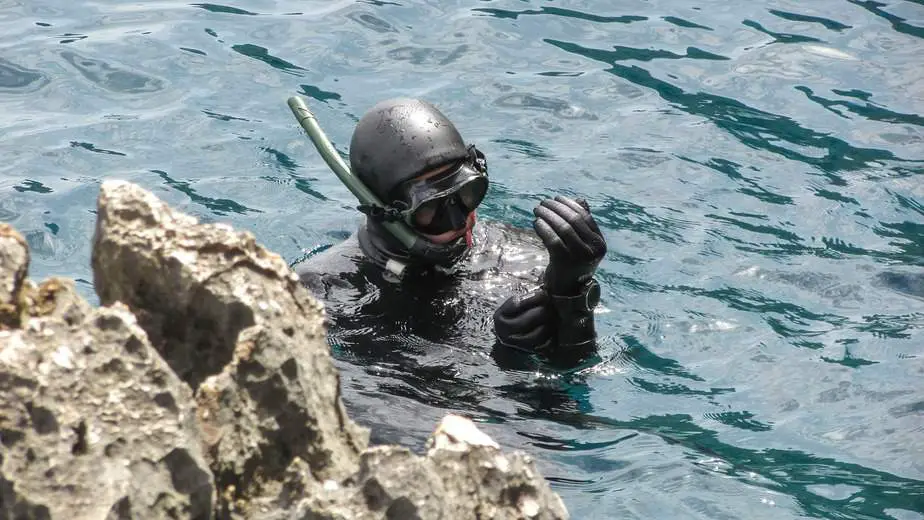
As we get older, our body, and our joints especially, are subjected to the wear and tear of high impact physical activity. Even the most basic of activities, running and walking, can cause joint pain when it is done on hard surfaces.
Unfortunately, this means that as we age, we can actually become less active because of the pain exercise can cause our joints. This is quite literally the opposite of what should happen – we need to stay physically active as we get older to maintain our health in old age. Thus, we need to find some low impact ways to train to preserve our joints.
That’s why snorkeling and other swimming-based activities are such a boon for those who want to stay nimble and mobile even into their old age. The near-weightless environment takes the weight and pressure off of our poor joints. This allows the elderly to participate in cardiovascular activities without further deteriorating their joints. The decreased pressure also reduces the chance of injury when engaging in this activity for those who are elderly or out of shape.
Another group of people who stand to gain the most benefit to their joint health are obese and overweight individuals. Again, the pressure their body weight places on their joints is greater than average, and any high-impact activity affects their joints even more than normal.
Mental health benefits
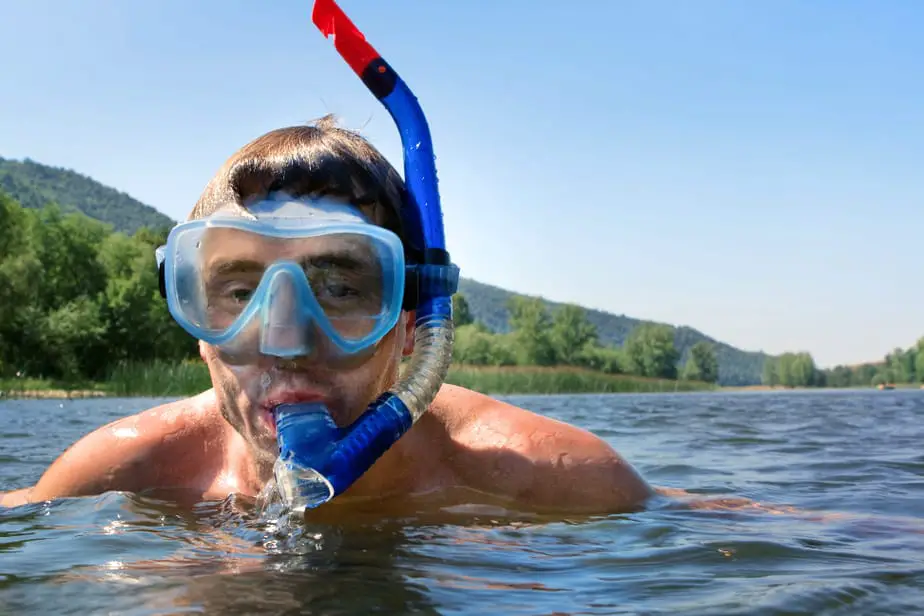
Both anecdotal evidence and scientific evidence suggests that swimming exercises such as snorkeling can improve one’s mental health by alleviating anxiety and depression. Furthermore, consistent exercise can leave positive effects on one’s mood and outlook due to the phenomenon known as the runner’s high.
It is still unclear exactly what’s happening, however exercise is known to cause the brain to feel relaxed and euphoric, similar to a drug high (hence the name and the common exercise associated with it). Thus, exercise is effectively a type of natural antidepressant, and can be a good release for people with pent-up emotions to use up their energy in a healthy way.
When you’re exercising, parts of the brain are activated that can neutralize the body’s fight or flight response. Swimming exercises like snorkeling can also decrease muscle tension which can help aid with anxiety relief.
Next, exercise has often been used as a treatment for depression. In the case of scuba diving (a snorkeling adjacent activity), it was found to cause large reductions in post-traumatic stress disorder (PTSD). For those with mild to moderate depression, try exercising and getting the natural runner’s high and you will feel as good as if you took an antidepressant.
Snorkeling can’t take all of the credit for improving one’s mental health; all exercise has been shown to have profound positive effects. The great thing about snorkeling, as we have already mentioned, is that it gets rid of the monotony of exercising which makes it a more enticing option.
Enhance mood and outlook
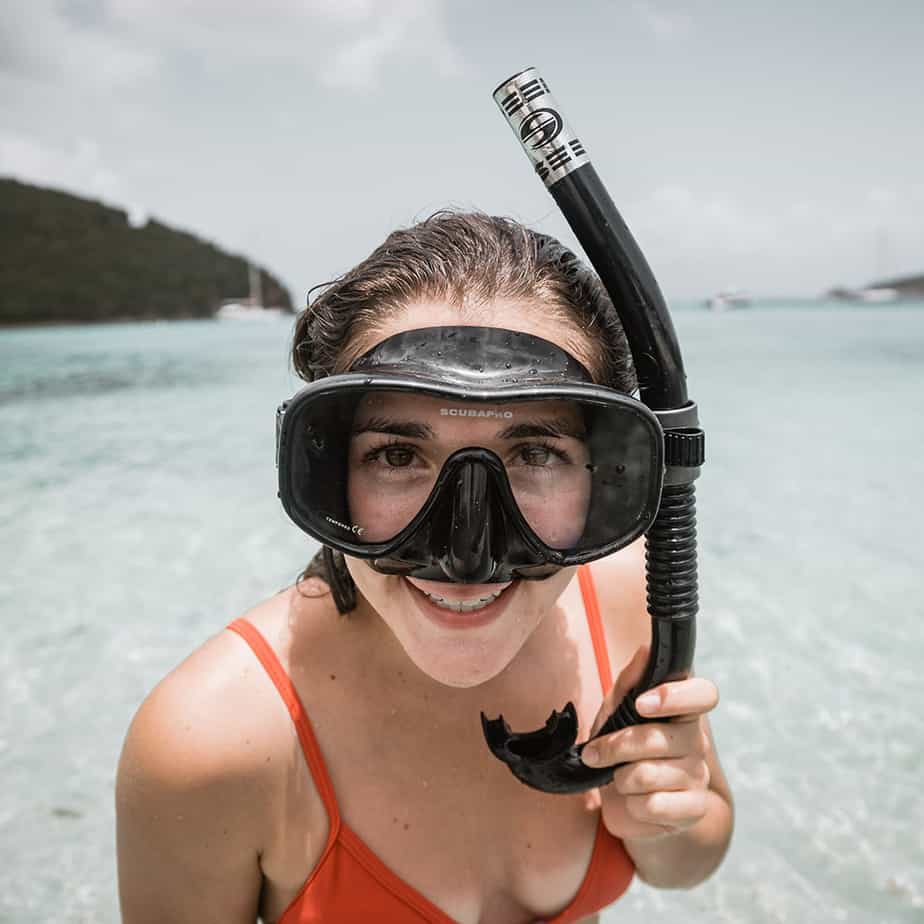
Whether you’re snorkeling at home or at tropical paradises like Hawaii or the Great Barrier Reef, it is sure to put you in a good mood. Getting yourself outdoors into a natural environment can do wonders for your mental state. Simply take in the sun and the beautiful sights, and your spirits will be lifted up in no time.
However, it’s not just the good company and gorgeous views that does wonders – physical exercise will help improve your mood and help you regulate your emotions more effectively. If you are angry or stressed, you can workout your pent-up emotions in a healthy way and feel better at the end of it.
Don’t just take our word for it. Studies have shown that swimmers tend to have improved mood in the long-term when adhering to a strict swimming regimen compared to the control group which did not swim. We are extrapolating from this study and using anecdotal evidence to make the claim that snorkeling, due to how similar it is to swimming, will improve your mood and outlook long after you leave the water.
Improve floating and diving ability
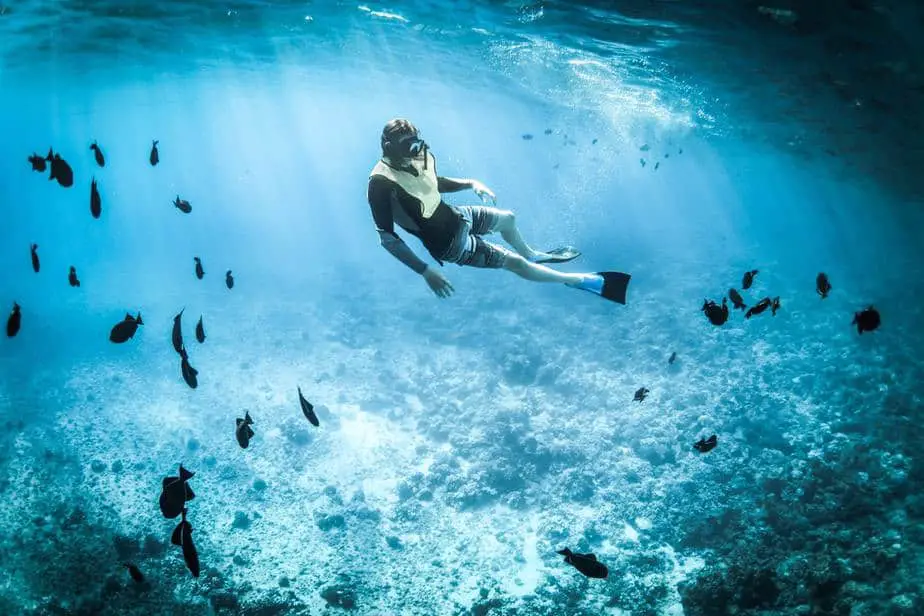
Since snorkeling is so similar to swimming, it follows that if you do a lot of snorkeling, your swimming ability will also increase. This means your confidence in the water will improve and you can enjoy all water activities across the board even more.
Practicing how to stay afloat along the water’s surface helps you control your buoyancy and your ability to tread water. If you ever find yourself in a situation where you need to stay afloat for some time, you will have the stamina and control to easily do that. With that said, you normally would be wearing a flotation device to assist with buoyancy, particularly if you’re in deep water.
As you get better at snorkeling, you might find staying by the water’s surface the whole time to get boring. You can take it to the next level and learn about skin/duck diving. What it is is essentially a breath-hold dive where you swim underwater and get a closer look at the marine life close-up. It allows snorkelers to explore underwater and take better photos.
Remember we talked about how your cardiovascular system will improve the more you snorkel? This means that when you hold your breath, you can dive for, say 1-3 minutes at a time, and get to explore a whole bunch before you need to surface.
Being better at buoyancy and diving ability is essential in emergency situations in the water, such as if you’re pulled out by a riptide or tossed over a boat. It’s also good for everyone around you since you might be able to rescue someone, or at the very least, save your own life.
Social benefits
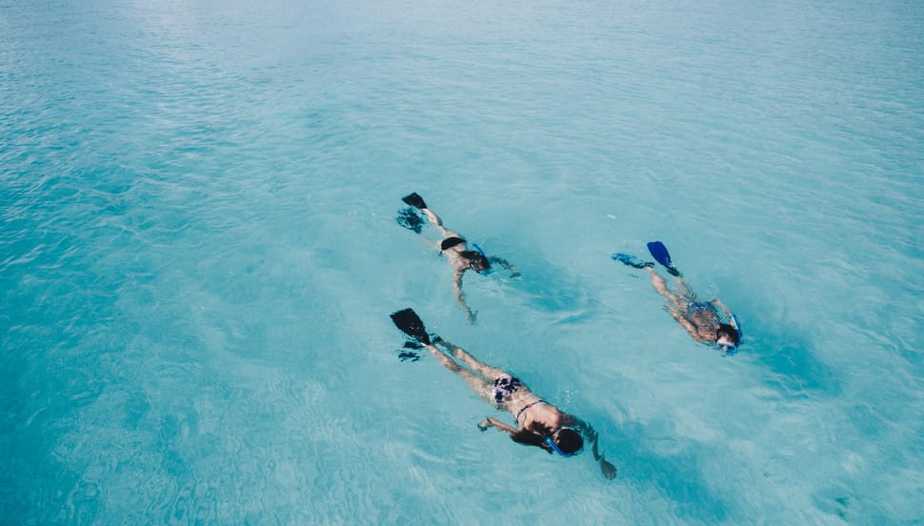
Snorkeling is more fun with at least one other person, if not a group. When you snorkel with a group, such as with your family, friends or as part of a tour, you get the opportunity to socialize, exercise, have fun, and have peace of mind.
People who have at least one partner to exercise with tend to stick with an exercise regimen for longer, have more fun, and reap the many benefits that being social provides, including:
- Better self-esteem.
- Improved confidence.
- Stronger immune system.
- Improved cognition.
- Longer lifespan.
- Decreased risk of dementia.
- Stronger social skills to form new friends with which creates a positive feedback loop.
Snorkeling is a casual activity that has a more relaxed feeling to it, unlike the competitive nature of some other group exercises such as competitive sports. The intensity of such sports can intimidate timid or introverted people who just want to recreationally do their own thing.
During snorkeling, there is no pressure to be the best. Everybody starts off at the same level, and there is no race to the finish line or anything like that. The incentive to improve is if you want to learn how to duck dive and increase your breath-hold time. Even then, it’s not like people are competing to see who can dive the deepest or longest (that’s what freediving is).
Even with a group, snorkeling has more emphasis on individual experiences where people are sort of doing their own thing but in close proximity to other snorkelers. If you want, you can buddy up and point out cool things you spotted. Otherwise, just being close to each other can provide peace of mind and comfort. If something should happen, there will be someone close by to provide assistance or call for help.
Spend more time in nature
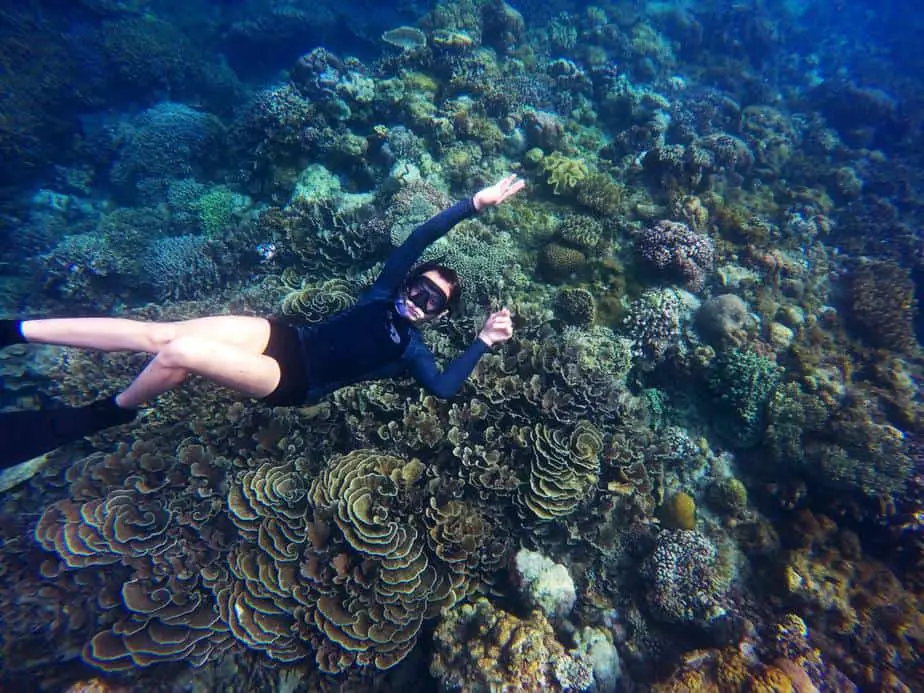
While many other forms of exercises share similar benefits with snorkeling, something that not all of them have is the opportunity to be so involved with nature. Literally the whole point of snorkeling is to be an observer of the underwater world. You spend the whole time looking at the coral reefs, the aquatic wildlife, and diving down to get a closer look.
This is much better than going to the zoo or aquarium where everything is behind a pane of glass. Seeing some of the most beautiful wildlife on this planet up close is a different experience. (Just make sure you don’t touch them or feed them).
Being in nature also breaks up the monotony of seeing the same things over and over again, which is a serious flaw of running on a treadmill or pedaling a stationary bike. In fact, it’s been shown that being immersed in nature can improve your psychology. This area of study is known as ecopsychology, and it is becoming more popular in the scientific field.
By immersing yourself in nature, you will experience feelings of interconnectedness and tranquility while decreasing feelings of isolation and negativity. Being immersed in nature can also lead to positive effects on psychological disorders such as aggression and ADHD.
Reduce stress
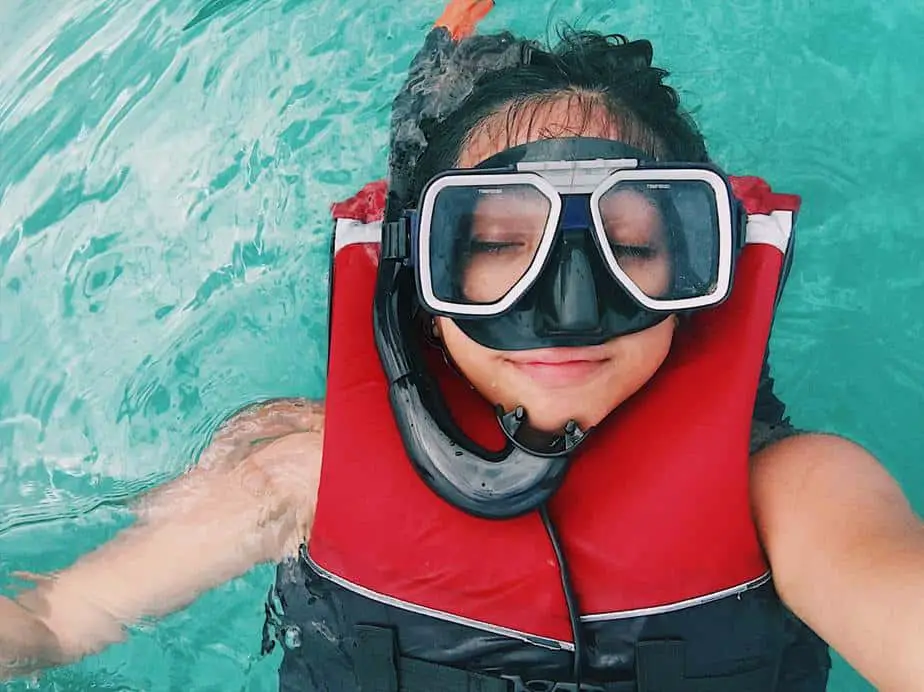
When the hustle and bustle of daily life gets too much and you want to get away from it all, what do you do? Where do you go? Some people go for a long walk, others go for a late night drive. If you know how to snorkel, then you have another option available.
Not only does an exercise like snorkeling decrease stress, but it can help you regulate your emotions by releasing your pent-up feelings of frustration or emotional tension in a healthy and productive manner. Being underwater will give you a sense of peace and tranquility that is hard to beat.
Scuba divers know this better than anyone since they can be completely submerged underwater. In that low-gravity environment, you can begin to feel your muscles relax and the tension leaving your body. Where snorkeling has an advantage is that only a bare minimum of equipment is needed to be able to enjoy this underwater experience.
Basically, almost anybody is able to start snorkeling in calm, shallow waters. It is the ideal stress-free and calm-inducing activity that also teaches you how to swim in the open water or reef environment.
Tone up your muscles
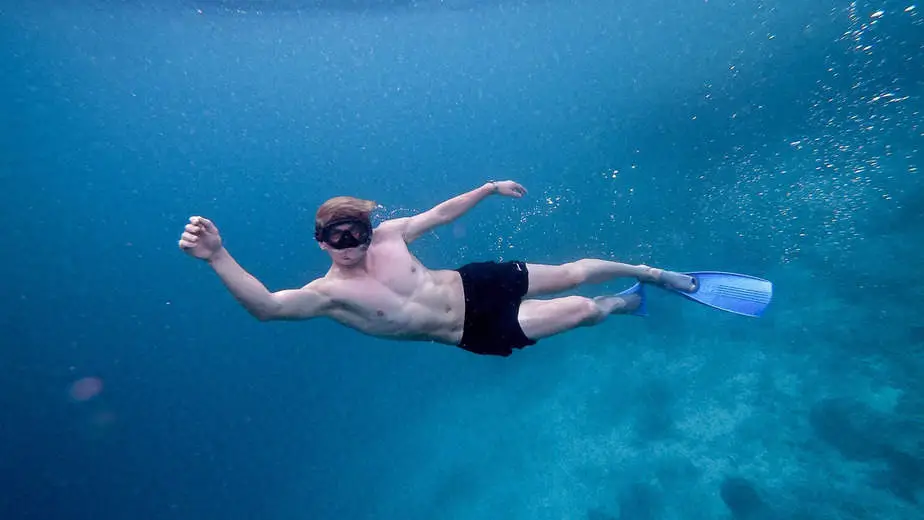
In addition to its cardiovascular and aerobic health benefits, snorkeling can train almost every single muscle in your body because it is a full-body exercise. Nearly every muscle, from the major muscle groups to those smaller muscle groups that are not commonly trained in land-based activities like the core muscles, will get trained.
If you live a sedentary lifestyle and you go snorkeling for the first time, you will feel your whole body ache afterwards. For instance, you will be rigorously moving your arms and legs to propel yourself and your core muscles to maintain balance. You’ll also work out your shoulders, abdominal muscles, obliques, arms, hips, thighs, and calf muscles. The legs will get the biggest workout since your kicks will be the most effective way to generate thrust.
Despite training nearly every single muscle in your body, you won’t be building mounds of muscle or gaining dramatic strength the same way that someone training with free weights might. What you can expect is to “tone” your muscle or give it some nice shape without getting too bulky. Take a look at how a swimmer’s body looks – lean, lightly muscled, and fit. You can get a body like that without accumulating joint stress or getting too bulky
Overcome your fear of the water
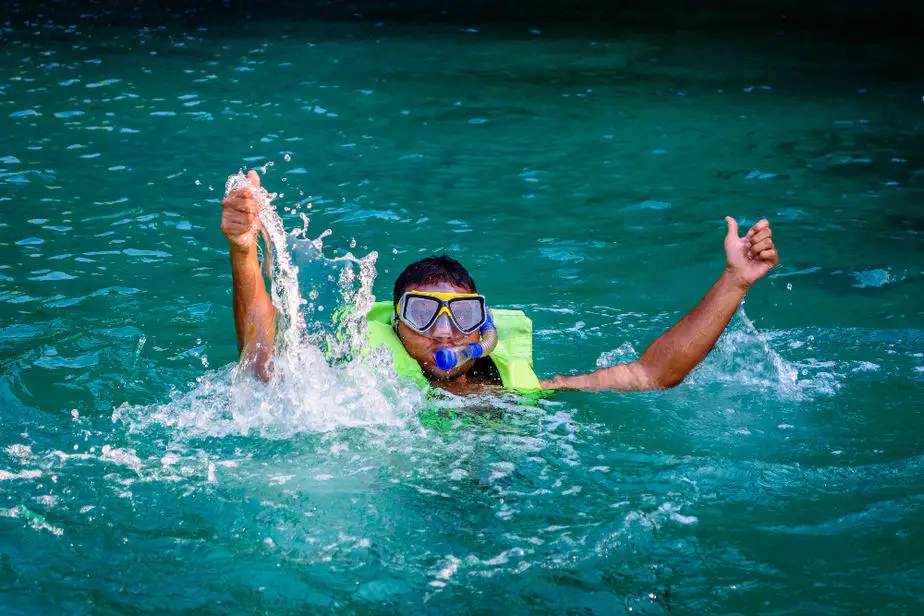
Snorkeling may seem scary at first, but it is actually a fantastic way to help one overcome their fear of the water (thalassophobia) and their fear of cramped spaces (claustrophobia). This type of training is known as exposure therapy, where a phobic person can slowly introduce a very small dose of the stimuli that scares them in the hopes that they can be desensitized to it. Over time, they will slowly overcome their fears.
Here’s how snorkeling can help people overcome thalassophobia. By wearing the snorkel mask, one can safely open their eyes underwater and this can remove much of the fear of the deep that some people have whenever they are in a large body of water. Plus, if they are in shallow waters or they are under the supervision of an instructor, they know that at any point they can exit the water which is a huge relief.
Similarly, some people experience feelings of claustrophobia when they wear a mask or are submerged underwater. To make things less scary, look for frameless masks or masks with a side window so you can get the widest field of vision possible. Basically, by getting rid of the frames or providing as much vision as possible, it lets snorkelers feel like they are looking through a large window which should hopefully reduce their claustrophobia.
Having these intense fears makes snorkeling and scuba diving too dangerous because it can cause the phobic person to panic. When they are panicking, they aren’t making rational decisions and are wasting oxygen. This increases the risk of a fatal incident.
Snorkeling is a much safer method of dealing with thalassophobia and even claustrophobia to an extent since it can be done in shallow waters where the waters are calmer. With that said, people with an extreme case of thalassophobia should go seek professional advice.
Get your vitamin D
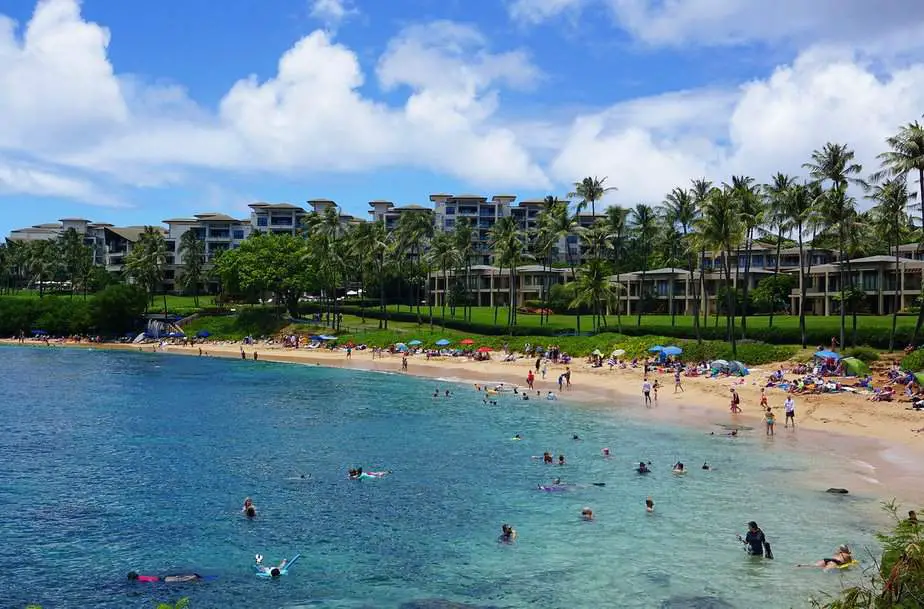
If you spend most of your time indoors, then you may not be getting enough vitamin D. Snorkeling, being an outdoor activity, provides a great excuse to be outdoors and bathing in the sunlight.
Sunlight is a crucial ingredient in the production of serotonin (the “happy hormone” that improves our mood) as well vitamin D. This vitamin strengthens the immune system and increases the production of bone and blood cells.
Assuming that you are taking the proper precautions to protect your skin from excess sun exposure, then soaking up the sun’s rays while snorkeling will not only improve your overall health, but it does wonders for one’s mood.
Being exposed to sunlight can even prevent some forms of depression from occurring, such as seasonal affective disorder (SAD, what a perfect acronym). There are a multitude of reasons why sun exposure is good for us, so anything that gets you out of the house and into the sunlight is a good thing.
What are the health risks of snorkeling?
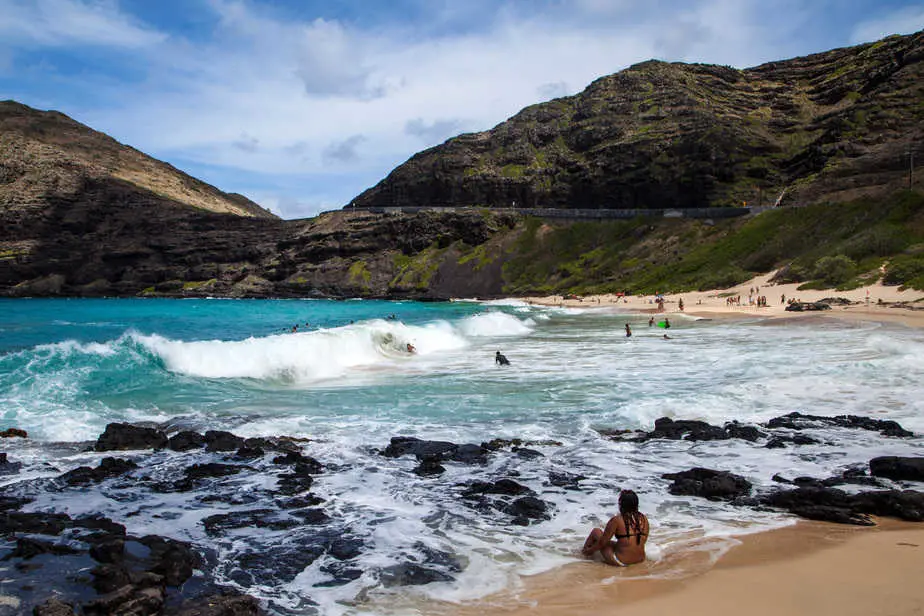
We have provided many arguments for why and how snorkeling provides many health benefits, whether directly or indirectly. However, for a select group of people, they may have some pre-existing health conditions that places them at risk if they were to start snorkeling.
Here are some of the people who should probably see a doctor or think twice before going snorkeling:
- People with pre-existing medical conditions: If you were diagnosed in the past, or you have family members with a chronic and genetic condition, you should definitely see a doctor to see if you can safely snorkel. If you have any conditions affecting your cardiovascular, respiratory, or nervous system, then that’s a red flag.
- Heavy smokers: You are allowed to be a smoker and go snorkeling, there’s no rule against that. However, be aware that snorkeling does heavily strain the cardiovascular system (breathing through that snorkel isn’t easy), so from a respiratory standpoint you are shooting yourself in the foot.
- Anxious people: If you’re nervous, it’s probably a sign that you’re not a strong swimmer. Some basic swimming capability is highly recommended for snorkeling, even if you are wearing a life jacket. Nervous people are more prone to panicking or hyperventilating, which can waste a lot of energy and oxygen. We recommend taking some swimming courses or even a snorkeling course to learn the basics.
- Unfit people: For similar reasons why smokers are at a disadvantage while snorkeling, people who are unfit due to their sedentary lifestyle may find themselves in too deep both literally and figuratively. Some level of physical fitness is necessary so that you can swim out of tough situations. Otherwise, you should stay in a protected area such as a bay or lagoon where the waters will always be calm.
While snorkeling is generally a laid-back and relaxing activity, any water activity inherently has certain risks like drowning or the sea conditions unexpectedly changing. For this reason, we recommend everybody wear some kind of buoyancy aid, whether that is a snorkel vest or a life jacket.
Without a flotation device helping you float, people who are out of shape may find themselves quickly out of energy and struggling to stay afloat or swim back to safety. Even fit people ought to use a flotation device to help them conserve energy for when they really need it.
The primary concern with how snorkeling can be bad for your health is if you already have a weak respiratory system (e.g. due to asthma) or other organs due to an existing medical condition or an unfit lifestyle. Suddenly introducing a large workload can be too much for your body to handle and can lead to a medical event or drowning.
Snorkeling can also expose you to various bacteria and viruses. For instance, sometimes people get ear infections from water in the bacteria entering their ear. Also, using rental equipment can expose you to a sore throat or the common cold. Make sure to thoroughly clean your snorkel gear between uses and to make sure the water in your ears dries to avoid these infections.

